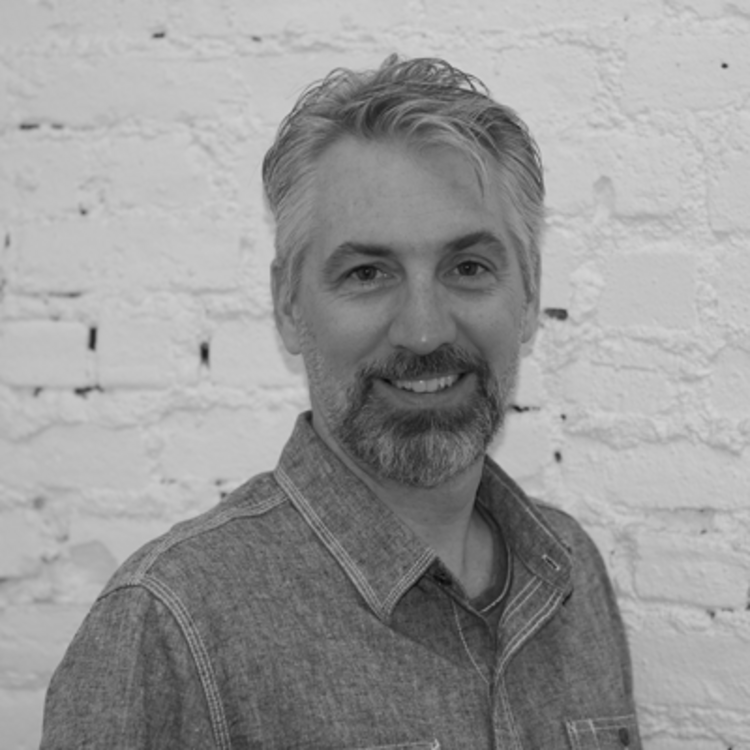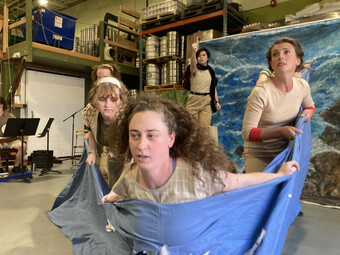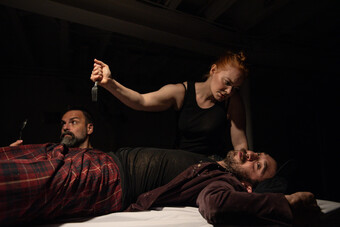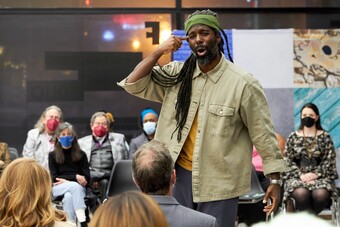Mine Own Deformity
Shakespeare Through the Lens of a Military Veteran
This series examines Shakespeare from a military veteran's perspective and offers a new angle on Shakespeare's text and characters, while delving deep into the challenges facing American theater and society.
Just after the first Gulf war, one of my soldiers committed suicide and a dear comrade was killed in front of me during a live fire training exercise. Questioning the meaning life, and contemplating an offer to go back into active duty military service, I hopped on an Amtrak and weaved my way around the western states. I jumped off in Montana and wandered into a theater. The house lights faded as a deformed man in a military uniform walked on stage. He had the same posture I had when I was recovering from a serious back injury in high school, leaning to the right and slightly back—clearly in pain. He looked me square in the eyes and said:
Now is the winter of our discontent
Made glorious summer by this sun of York;
[Richard, Duke of Gloucester, Richard III, Act I, scene 1]
While watching this deformed, military man, I felt a chromosomal explosion in my body. I writhed in my seat. I jammed heaving sobs back into my mouth only to have them come out louder. I dry heaved while his speech sliced its way directly to my subatomic matter.
Here's what he said, next to the way I heard it:
Now is the winter of our discontent
Made glorious summer by this sun of York;
Right now, your country is safe because of me, and those of us who sacrificed and served;
And all the clouds that lour’d upon our house
In the deep bosom of the ocean buried.
And all of the threats abroad are crushed.
Now are our brows bound with victorious wreaths;
Now I replace my Kevlar helmet and military caps with stupid, civilian, party hats;
Our bruised arms hung up for monuments’
My weapons of war are gone; my combat gear is now a souvenir to go on walls and shelves,
Our stern alarums changed to merry meetings,
The days of “Warning Orders” are over, and my salutes become handshakes,
Our dreadful marches to delightful measures.
My days of marching with a thunderous herd of brothers in formation, rattling windows and singing to cadences are done. I will now walk awkwardly, out of step amongst strangers.
Grim-visaged war hath smooth’d his wrinkled front;
My days of training for war are over, I'm out, and we're at peace;
And now, instead of mounting barbed steeds
And now, instead of climbing aboard Bradley Fighting Vehicles, UH-60 Blackhawk helicopters, C-130, and C-141 aircraft
To fright the souls of fearful adversaries,
To terrify and to fight the enemy,
He capers nimbly in a lady's chamber
To the lascivious pleasing of a lute.
I must learn to talk nice, get over it, leave it all behind, and fit seamlessly back into pleasant society.
But I, that am not shaped for sportive tricks,
But I ain’t right. Every other word out of my mouth is the f-bomb and all I want to do is fight and wreck shit.
Nor made to court an amorous looking-glass;
I can't even look into a mirror! I hate what I see!
I, that am rudely stamp’d,
I spent my formative years recovering from a back injury and then training for war,
[...]
I that am curtail’d of this fair proportion,
I'm not the hometown boy next door; I feel like a monster and a coward,
Cheated of feature by dissembling nature,
I joined the army 'cause I felt ugly, weak, underdeveloped, unmanly, and insecure.
Deformed, unfinish’d, sent before my time
Into this breathing world, scarce half made up,
I've got an inverted chest, a misshapen head, a big nose, a bad back—I could go on. I'm a mental mess dumped into the civilian world.
And that so lamely and unfashionable
That dogs bark at me as I halt by them;
I'm so high-strung and amped that dogs pick up my nervous energy and bark and growl at me;
Why I, in this weak piping time of peace,
Have no delight to pass away the time,
Me, without the structure: I lack focus, connection, and a clear mission for my life, hell, for my day!
Unless to see my shadow in the sun
And descant on mine own deformity:
Unless I focus on what a loser and a coward I am. Or I happen to see my disgusting reflection in the mirror, a photo of me now, or I see faces seeing me.
And therefore, since I cannot prove a lover,
To entertain these fair well-spoken days,
And since I fake it to fit in, I hate my life and myself now, and regret leaving the army,
I am determined to prove a villain
And hate the idle pleasures of these days.
I vow to drink, lie, keep moving, make a mess wherever I go and tear every place and every relationship apart.
My feeling watching Richard III continued long after the play, driving me to turn down an offer for active duty, to exit the Minnesota National Guard, and to enter graduate school for theater. I should think that my feeling counts as a catharsis. To me, this catharsis shows more than just the power of theater—it shows the very function of theater.
Engaging in classical training and acting in Shakespeare's plays for over the last seventeen years has brought me face to face with mine own “deformities:” my "Labrador-reflex" (my automatic response to a threat with violence), my judgments and my condemnations of myself and others (at least, what I thought I knew about myself and others), my prejudices (and the discovery that these are learned), my self-image (or rather, my inner duel of who I am versus who I want to be), and my perceived disconnection to other people (my learned automatic response to establish an “us” versus “them”).
In my opinion, this is the function of theater: to face and dissolve our “deformities,” and to erode the barriers that establish an “us” and a “them.” To create a safe, secure space where we listen without condemnation, speak the unspeakable, and share our personal truths—to discover both a deeper understanding of ourselves and a stronger connection to each other.
Our veterans, our families of veterans, and our society as a whole seem to live in some form of constant crisis. Let us use the age-old function of theater and its tools to face and deal with these crises.











Comments
The article is just the start of the conversation—we want to know what you think about this subject, too! HowlRound is a space for knowledge-sharing, and we welcome spirited, thoughtful, and on-topic dialogue. Find our full comments policy here
Bravo! Your bravery in sharing and revealing never ceases to amaze me. Your Richard III is simply the best I've ever seen in 22 years. Now I know why. I'm glad you found your voice and are helping others to do the same. Let the catharsis continue!
One of the best series on the true, as you point out, FUNCTION of theatre that I've ever read as an actor, and one of the most meaningful I've ever read as a combat vet's daughter who was 15-17 when her Dad served in OIF.
Thank you, Stephen, for this series. I teach a class on "Acting Shakespeare" to senior students in a strong undergraduate program and find that the importance of "getting the words into the body" is always crucial, first and last. I plan to use your Richard III "personal translation" as a brilliant and courageous example for the students of the no-holds-barred honesty that actors need to confront the text and make it their own. I look forward to reading the rest of your series.
Stephan, I especially love your words, 'speak the unspeakable'. You make me think of how words are sometimes unspeakable because they're not adequate to the experience (Hamlet), or because the despair is 'unspeakable' in its murky depths (Egeon); or because experiences fly ahead of the words with which we're constantly trying to catch them. I have a question about the speech you've chosen to annotate here: do you think that one of the marvels of Richard III's character is that he has learned to look square at the mirror and say: 'This is what people see in the world. I'll cut my coat to suit my cloth'? I'm just wondering because I saw Anna Deveare Smith's amazing 'Notes From the Field' the other night, a town hal project which focusses on people who have been brought up with terrible, fractured self-mirrors ('negative' is almost too benign a word), and who find themselves shooting down the pipeline that takes them from unspeakably unnurturing childhoods to juvenile halls, and from there to prisons. There has never been any safe mirror for them, and it sounds like this is part of what you're getting at when you say that war was a different kind of related 'pipeline' to trauma for you: 'I joined the army 'cause I felt ugly, weak, underdeveloped, unmanly, and insecure.' Thank you for this quite amazing article. I notice there is a whole string of them which I am going to sit down and read next week with some time away. So you may have touched on some of these themes in others - I'll find out.
First, thank you everyone for the kind words... and for READING my articles!
Second, in response to your question Philippa: "do you think that one of the marvels of Richard III's character is that he has learned to look square at the mirror and say: 'This is what people see in the world. I'll cut my coat to suit my cloth'?" Yes that is ONE of Richard's cause for his behavior throughout the play, at least in my opinion. For example: in Henry VI, part 3, act 5, scene 6, Richard has just murdered Henry VI in the Tower, and Richard states: "Indeed, 'is true that Henry told me of;/For I have often heard my mother say/ I cam into the world with my legs forward./ had I not reason think ye, to make haste/ And seek their ruin that usurped our right?/ The midwife wondered and the women cried/'O, Jesus bless us, he is born with teeth!'/ And so I was, which plainly signified/ That I should snarl and bite and play the dog." He continues: "Then, since the heavens have shaped my body so,/ Let hell make crook'd my mind to answer it." But I notice that he is saying his mind is not yet crook'd like his body. and in Richard III he has a nightmare of all whom he has murdered and he curses his conscience, thus obviously he still has a human conscience which haunts his actions. My point being, that first and foremost he is a human. A human being treated inhumanely, and then returning the treatment, but remains haunted by his humanity. One of the many lessons for me in Richard is to eliminate the "binary". The "us" and "them". Eliminate the hero and the villain, and instead see humans in inhumane circumstances. Break the binary and begin anew, from a place of compassion, of understanding, of connection to our humanity. This is how we stop repeating history.